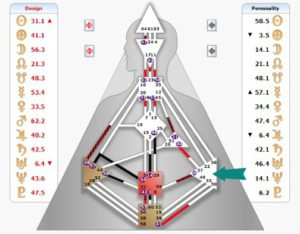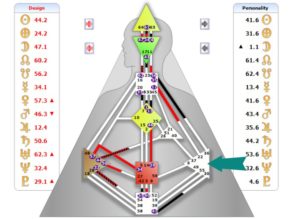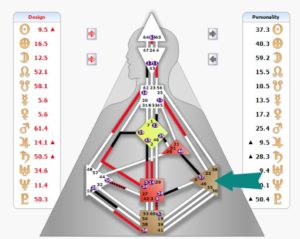What Kind of Empath Are You?
How does being an empath affect your work & relationships?
When I was first learning about Highly Sensitive People and Empaths I loved taking the quizzes and finding out how many characteristics of empaths & HSP’s I possessed. But I gotta tell you, I didn’t necessarily find that information practical.
I knew I was sensitive to the energies of others, especially their emotions – but this awareness didn’t give me tools or deeper awareness of what to DO when affected by others. It just made me feel like I needed to protect myself at all costs and never leave the freakin’ house!
Have you ever felt that way too?
Furthermore, after working with thousands of people and hundreds of unique Human Design charts, I’ve come to realize that we are ALL empaths to some extent – it’s part of being a human being!
That said, not all of us experience empathy in the same way, nor do we process emotions or energy in the same way – and understanding THIS has made all the difference for myself and my clients.
I’ve identified 3 main kinds of empaths based solely on the Solar Plexus center (emotional center) in Human Design. Within these types there are infinite combinations based on what gates, channels, and other centers are defined in a person’s chart – but to keep it very simple (and practical) I’m going to share with you the 3 overarching types and how to work with strong emotions.
Emotions are some of the most potent energies we exchange as humans and they tend to derail us faster than anything else affecting us at home and at work and causing all kinds of problems internally (manifesting as stress), and externally (in relationships and work productivity).
I’ll share with you at the end of the article how to discover which Type of Empath you are, along with my favorite empath tool I teach ALL my clients, but first – read the descriptions and see if you can identify yourself (or others close to you).
Empath Type 1: The Amplifier

Undefined (white) Solar Plexus with one or more gates defined (defined simply means it’s “turned on” 24/7 and is indicated by a color on the chart). You take in the emotions of others and AMPLIFY those emotions. For instance, you may be with a friend, family member or co-worker who is feeling frustrated, you’ll experience that frustration more intensely and deeply and it will often feel like anger or rage in your own body.
Your natural state is to be emotionally neutral (provided no major drama or crises is occurring). Many, if not most, of the emotions you experience are NOT YOURS, you are taking these emotions in and amplifying them. This happens naturally and energetically – it is not something that can be controlled, nor does it need to be ‘fixed’.
The gates you have defined in the emotion center will determine the way you experience emotions personally, as well as how you express those emotions. You prefer to avoid conflict because the emotional amplification during conflictual and stressful conversations can often feel overwhelming.
Empath Type 2: The Mirror

With no gates colored in and an undefined solar plexus center you can be detached from the emotions of others and even perplexed at how others allow their emotions to pull them this way and that. With this detachment you may find yourself to be the grounding force in crisis situations.
While you do experience personal emotions, you prefer not to lead with them or show them to many except those closest to you. Cool and detached are how you usually roll. That said, without self-awareness and emotional tools, you may find yourself deeply affected by the emotions of others (especially loved ones).
You “mirror” the emotions of others – either consciously (as in healing sessions or while acting) or unconsciously (as with intimate relationships without clear emotional awareness & ‘boundaries’). You can also ride the emotions of others quite effectively – you’d make a great actor or actresses because you are able to completely embody an emotion for the stage, then let it go…
Empath Type 3: The Recycler

If you are this type and have your solar-plexus center defined, you feel everything – the high-highs, the low-lows and everything in-between. You too, can take in the emotions of others (we ALL do this regardless of our design) however, instead of amplifying those emotions, it reminds you of ALL the times you ever felt that way in the past and immediately you are on an emotional wave-train that you hadn’t bargained for.
The emotions recycle over and over until they shift or peter out. Where the other types can “ride” the waves of emotion and detach more easily from emotions – you experience the wave of emotion crashing through you. It’s a full-body experience and can be quite intense. I’ve had clients describe it as being swept backwards through all the memories and feelings without knowing why, and without being able to detach from past experiences easily (until they have tools!).
Tools for Empaths:
It doesn’t matter what type of empath you are, these two tools will assist you with feeling grounded and regaining your personal emotional equilibrium so you can communicate effectively and get back to your work & activities quickly and compassionately. It’s not about forcing yourself or others to feel better, but rather to bring conscious awareness to emotional & empathic states and create space to choose how you’ll work with the emotions & energy vs. being at the whim or mercy of them.
Tool #1 Return to sender: When experiencing a strong emotion or energy ask yourself: “Who or what does this belong to?” You may feel a slight shift or lightening of the emotion or energy, or you may have an awareness of a person from which the emotion originated – if so, for certain it is NOT YOURS. Say to yourself: “Return to sender with love & consciousness.”
You may not feel anything when you ask ‘who does this belong to?’ but it is still effective to “return to sender” because this will help you sort out which part of the emotion is yours, and what belongs to someone else.
You can only deal with & heal your own emotions, so returning to sender the energy & emotions they are radiating is not only compassionate for you and them, it’s part of their healing process.
Tool #2 What’s the story?: Especially for the Type 3 Recycler, but can work for any of us regardless of our design. The mind LOVES to get involved when emotions are high. Especially if there is no “logical” reason why we are feeling the way we do – which let’s face it, is a lot of the time!
You lose someone you love, you feel sadness or grief…makes sense. But sometimes emotions arise and we get confused because one moment we’re fine and the next feeling something very intensely, seemingly without provocation. In truth, someone else is feeling something and we are taking it in. Even if we are emotionally aware this happens very easily as we communicate energetically first & foremost (and emotions are energy).
When most of us feel a strong emotion we either ask “why am I feeling this way?” or “what’s wrong?”. Alternatively, we try to ignore the feeling or push it down. Either way, the mind will jump in to “help” us by rationalizing, justifying, or coming up with a very creative story as to why we feel the way we do. This serves to trigger the emotion further and/or keep it running and replaying, sometimes even getting more intense along the way.
The mind is great for asking clarifying questions, but the answers we get are only as good as the questions we ask. Instead of allowing the mind to run wild, pause and ask: “Is this true?” or another great question from Access Consciousness: “What’s right about this that I’m not getting because I’m so____?” (angry, sad, overwhelmed, etc.)
This last question can help you discern what’s really yours, and it also give your mind a different thing to seek out: what’s RIGHT vs. what’s WRONG. When we focus on what’s wrong, we tend to get more of it and feel worse – whether the emotions started with us, or someone else.
Try using one or both of these tools next time you’re experiencing a strong emotion and are feeling overwhelmed or derailed by that emotion, or the stories your mind is making up about the emotion.
If you’d like to learn more about what kind of empath you are you can order a free Human Design Chart HERE.
And if you’d like to learn more about your design and how to use your natural intuitive & empathic gifts while minimizing your design ‘challenges’ then I recommend checking out either a 2-hour deep dive into your design or a 1-hour focused reading. Both will bring incredible clarity and help you understand how to work with your emotions as well as clarify your work & relationship patterns, along with your innate gifts & life purpose.
Let me know how these tools work for you!
From My Heart & Soul To Yours,
Kris
